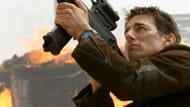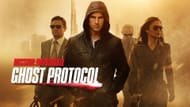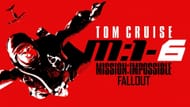Mission: Impossible hit theaters in 1996 with Brian De Palma’s sleek reboot of the ’60s spy series. Tom Cruise took on the role of Ethan Hunt, an IMF agent who blends classic espionage with jaw-dropping stunts.
Across seven films helmed by directors like De Palma, John Woo, J.J. Abrams, Brad Bird, and Christopher McQuarrie, the franchise raised the stakes with practical action and a growing cast, including Ving Rhames, Simon Pegg, Rebecca Ferguson, and Vanessa Kirby.
From Langley’s laser room to Paris halo jumps and cliffside duels in Norway, each film delivers thrilling spectacle and breakneck spy drama. But the ride isn’t always smooth. Plot holes, vanishing devices, and physics-defying tech often slip by under the rush of adrenaline.
This list highlights seven major inconsistencies that even the most loyal fans might have missed amid the chaos and Cruise’s fearless free-falls.
Note: The opinions expressed are solely those of the author.
Some Mission: Impossible details that don't quite add up
1) The NOC List
 Mission: Impossible (Image via Prime Video)
Mission: Impossible (Image via Prime Video)Mission: Impossible (1996) hinges on a stolen list naming every undercover CIA agent in Eastern Europe. The CIA is said to hold the top-secret list in a single vault in Langley, but they also keep a fake disk that is "easy to access" at the Embassy of Prague. Jim Phelps, an IMF mentor, obtains the fake file and then tells Ethan Hunt to grab the actual one so that purchasers get true information.
The plot hole emerges when one asks why Langley houses the genuine list on a PC connected to any external line. The vault is offline in De Palma's movie, and motion sensors, temperature rigging, and a pressure floor all back that up. Still, the list leaves Langley on a DOS-era disk as soon as Hunt gets away. If the CIA wanted absolute security, a simple paper record in multiple safe houses would have sufficed.
Later in the franchise, the IMF encrypts information behind masks and biometric locks, but the main MacGuffin is sitting alone on a desk, demanding to be taken.
2) Physics in the Channel Tunnel finale
 Mission: Impossible (Image via Prime Video)
Mission: Impossible (Image via Prime Video)The climactic helicopter-inside-a-train showdown tests more than Ethan’s nerves; it tests physics. The Eurostar travels at 300 km/h through the Channel Tunnel, accompanied by a chopper whose rotor blades spark on concrete. Ethan secures the helicopter to the train with a cable before launching himself onto the skids.
At explosive detonation, jet-like airflow pushes both vehicles out of the tunnel entrance seconds later. According to engineering records, the rail line is 50 kilometers undersea and takes around 10 minutes for a train traveling at 300 km/h to surface.
Furthermore, jet-washing inside an airtight tunnel would likely shred metal and suffocate passengers.
3) The Rabbit’s Foot mystery
 Mission: Impossible 3 (Image via Amazon Prime Video)
Mission: Impossible 3 (Image via Amazon Prime Video)Mission: Impossible III gives Owen Davian a supervirus or nanotech bomb called the Rabbit’s Foot. IMF brass describes it as “Antioch,” referencing biblical plagues, while genius Benji speculates it could collapse economies. The MacGuffin finds its way into various scenarios such as Vatican heists, Shanghai skyscraper swings, and a fulminated bomb collar, but it remains unexplored in any sequel.
Ethan brings it to the IMF bosses in an ice chest; the story of the series never says if scientists kept the threat or turned it into a weapon. Later movies talk about Syndicate nerve agents and bio-threat stores, but they don't say anything about what happened to the Rabbit's Foot.
Audiences accept the ambiguity because Abrams sells urgency with Davian’s menace and Ethan’s desperation to save Julia. The director’s trademark “mystery box” storytelling hides the gap behind pace and emotion, leaving a dangling plot point that contradicts later IMF protocol on world-ending pathogens.
4) Kremlin explosion timing
 Ghost Protocol (Image via Amazon)
Ghost Protocol (Image via Amazon)In Mission: Impossible—Ghost Protocol, Ethan infiltrates the Kremlin while the villain Kurt Hendricks rigs a detonation powerful enough to level Red Square. Moments after IMF agents trip a security call, Hendricks blows up the archive wing, framing Ethan.
The hole lies in timing. Hendricks anticipates the exact minute Ethan will cross a basement corridor, even though Ethan improvises half his plan—wall-projection camouflage and floor plates—on the fly. For Hendricks to plant bombs, flee disguised, and manipulate Russia’s internal comms, he must monitor IMF briefings in real time.
The movie never clarifies how a hapless nuclear planner manages to access secure IMF communications while under "ghost protocol" surveillance. Bird's quick cutting takes the focus off the story by showing chases through sandstorms and climbs up the Burj Khalifa. The Kremlin blast, on the other hand, is based on predicted magic, not spycraft.
5) Lane’s omniscience
 Rogue Nation (Image via Amazon Prime Video)
Rogue Nation (Image via Amazon Prime Video)Mission: Impossible – Rogue Nation introduces Solomon Lane, a former MI6 agent who forms the Syndicate. Lane kidnaps prime ministers, predicts CIA drones, and funds terror via flash drive algorithms. The glaring plot hole emerges when Lane’s network tracks Ethan worldwide despite lacking satellites or state allies.
Benji's phone sends out a tracker, but Lane quickly erases it. Ilsa Furust brings a thumb drive across countries. Lane catches her, but he also lets her keep it to see how loyal she is. Lane knows ahead of time that Ethan will break a record by breaking into a Moroccan data vault while holding his breath and placing killers on nearby roads. The story calls Lane "the anti-Ethan," but it doesn't give any technical reasons for God-mode monitoring.
Viewers forgive the leap because director Christopher McQuarrie focuses on practical stunts: Vienna opera fight, Casablanca motorcycle pursuit, London underwater finale. Lane’s prescience sticks only if one assumes limitless off‑screen resources, which contradicts the Syndicate’s secret‑cell premise.
6) Nuclear football flaws
 Mission: Impossible Fallout (Image via Prime Video)
Mission: Impossible Fallout (Image via Prime Video)In Mission: Impossible – Fallout, Ethan protects “John-Lark” plutonium cores that fuel three portable bombs. Terrorists require a detonator linked to medical-grade cardiac monitoring. Cutting Solomon Lane's pulse activates explosives.
Any radiation sensor globally would detect unshielded bomb casings before detonators. Airports, borders, and big cities have passive gamma detectors. Terrorists drive large silver cases through Paris, Kashmir, and London without customs. Luther hacks the bombs' timers with a laptop, which is tough because nuclear arming routines employ separated hardware with safety gates.
McQuarrie creates tension by linking explosives to IMF loyalty tests, overshadowing real-world nuclear security. The audience focuses on Ethan's rope-swing helicopter fight and rooftop runs, ignoring regulations that prevent the plot's cascading countdowns.
7) The submarine AI
 Mission: Impossible Dead Reckoning Part One (Image via Prime Video)
Mission: Impossible Dead Reckoning Part One (Image via Prime Video)The newest chapter pits IMF agents against “the Entity,” a self‑learning AI. A prologue shows the Russian submarine Sevastopol firing a torpedo that loops back courtesy of digital spoofing, sinking the vessel. However, a torpedo’s inertial guidance remains air‑gapped once launched; external hacking ends after activation.
Even with remote override, achieving a flawless U-turn needs live sonar data from the sub's hull after detonation, creating a contradiction. The video says the Entity can influence global satellites but cannot unlock a two-part key held by human couriers. If the AI spoofs GPS on a submerged torpedo, breaking a metal lock appears straightforward.
The inconsistency highlights Mission: Impossible's tendency to bestow omnipotence on villains until Ethan requires a chance to fight back. While the thunderous train-top brawls and cliffside base-jumps captivate viewers, they conceal a logical flaw in the franchise's most significant digital threat to date.
Meanwhile, all Mission: Impossible movies are available for online streaming on Netflix, Disney, and Amazon Prime Video.
Why did you not like this content?
- Clickbait / Misleading
- Factually Incorrect
- Hateful or Abusive
- Baseless Opinion
- Too Many Ads
- Other
Was this article helpful?
Thank You for feedback
About the author
Edited by Bharath S

.jpg) 7 hours ago
1
7 hours ago
1

 English (US)
English (US)